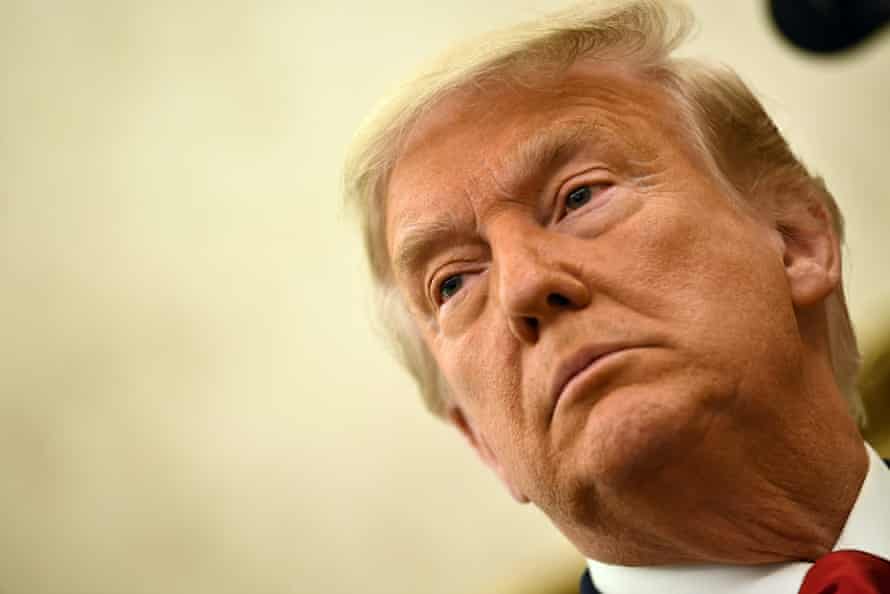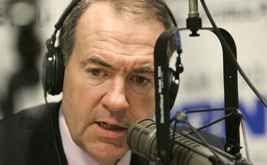
President Donald Trump speaks to right-wing talk show host Rush Limbaugh. (Jim Watson / AFP via Getty Images)
Subscribe To The Nation
Subscribe now for as little as $2 a month!
"Why Did So Many Americans Vote for Donald Trump?" asks the headline in The New York Times shortly after the election. Weirdly, that article—and hundreds like it purporting to explain the previous 2016 election—lacked even a single mention of the roughly 1,500 right-wing talk-radio stations that saturate every corner, no matter how remote or rural, of America.
As a 2008 Pew Research poll found, 16 percent of Americans got their general election-year information about presidential candidates from talk radio, a percentage that had held constant for eight years at that point, despite the explosive growth of the Internet over the same period.
Talk radio gave Lindsay Graham the edge to hold his seat in South Carolina—defeating Jaime Harrison's advertising—with 16 radio stations covering the Palmetto state. And in that flood of coverage, there was not one progressive voice speaking to the white community. Graham bet national and local talk-radio hosts would back him, and he was right, a reality that polling seems to have missed.
The takeaway? Radio works. In 2000 and 2016, Rush Limbaugh and his national and local right-wing colleagues helped put Bush and Trump in office, along with thousands of state and local Republican candidates all across America.
TALK RADIO
HOW TALK RADIO WORKS
Good talk show hosts know their job isn't to find or interview "good guests"; it's to build a trust relationship with their audience, cemented over years, caller after caller, day after day. Truly effective hosts like Limbaugh and Michael Savage talk to their listeners as if they're close and trusted friends.
This is a dynamic unavailable to podcasting or television, as it is impossible to replicate without live listener interaction. And campaign advertising doesn't hold a candle to its persuasive power. Republicans know this and value the full three-hour show praising a politician far more than even dozens of one-minute paid advertisements.
The power of talk radio doesn't come from the information it conveys; believing that is the number-one mistake beginner hosts make. At its most effective, listening to a talk host's show should be like picking up the phone to talk with someone you know and care about, someone who's become as familiar as a childhood friend.
While Democrats spend over a billion dollars on paid advertising every two years, and several billion every four years, Republicans use this model of long-term trusting relationships to get out the vote for the GOP. They know the truth of the old advertising saying, "Nothing beats word-of-mouth." And a recent Neilson survey supports that adage when it found that 92 percent of consumers "believe recommendations from friends and family over all forms of advertising."
In 2016, right-wing talk radio gave Donald Trump the boost he needed to put him in the White House. The hosts loved him and promoted him relentlessly. The same goes for George W. Bush. And why? Every weekday, all across America, people get into their cars and drive to or from work listening to the radio; as the nation's largest statistics organization, Statista, notes, "During an average week in September 2020, radio reached 90.9 percent of all American men aged between 35 and 64 years of age." It also reaches women, but the audience for the talk version of radio, according to the Radio Advertising Bureau, is 65.4 percent male to 34.6 percent female. And listenership is overwhelmingly white.
SOME POLITICIANS UNDERSTAND ITS POWER
On the left, Bernie Sanders stands out for how well he understands the power of talk radio. But that's rare for politicians on the left. The ones who understand it best are Republicans—like Donald Trump, George W. Bush, Dave Brat, Scott Brown, and Newt Gingrich. "Wherever I went on Bernie's behalf, everywhere in the country, there were people who'd shout out, 'Brunch With Bernie' or otherwise reference hearing him on your show," Representative Ro Khanna, cochair of Bernie's 2020 campaign, told me on my program during the 2020 presidential primary. "Literally everywhere we went."
In 2014, the second-most-powerful person in the House of Representatives was majority leader Eric Cantor, representing Virginia's seventh district. Dave Brat was an obscure college teacher. Cantor spent over $5 million to ensure his primary reelection; Brat spent only $200,000. Cantor's campaign was managed by experienced GOP professionals who'd made him one of the most powerful politicians in America; Brat's was managed by a 23-year-old political neophyte.
Brat had the support of both national and local Virginia talk show hosts; Cantor lost them when the Tea Party threw in with Brat. And the Tea Party and conservative talk radio were so tied-at-the-hip that Politico's investigation that year into their coordinated messages and shared funding sources was titled "The Tea Party Radio Network."
A few months later Hillary Clinton acknowledged the power of talk radio to fuel grassroots populism, noting with one New Hampshire example that Republicans "would rather threaten the livelihoods of those 164,000 jobs than stand up to the tea party and talk radio."
Cantor was the first House majority leader to lose a primary election since the position was created in 1899, and it wasn't even close: Brat beat the incumbent by a 12-point margin.
Meanwhile, the reason Obamacare doesn't have a public option provision wasn't just the $1 million-plus that Joe Lieberman took from the insurance industry; if Scott Brown hadn't taken Ted Kennedy's seat in the Senate, Lieberman's threat would have become inconsequential.
And talk radio helped put Scott Brown in the US Senate, with 18 right-wing talk stations across Massachusetts—and not a single progressive station in his state. Politico noted, "During Scott Brown's underdog campaign for Senate in a 2010 special election, his aides noticed clusters of donations totaling $15,000-$20,000 coming in from communities on the other side of the country at odd times of day." Conservative hosts were promoting him coast to coast, long after the East Coast had gone to bed.
Right-wing talk radio has been integral to Republican strategy for decades. In 1994, when Newt Gingrich took control of the House of Representatives, he understood the power of talk radio. "For the first 100 days of the congressional session," writes Randy Bobbit in his book Us Against Them, "talk radio hosts broadcast live from the capitol building…. When the talk radio throng outgrew the working spaces available, Gingrich allowed some hosts to work in the extra space in his office." George W. Bush repeatedly invited talk-radio hosts to broadcast from the White House; Trump has continued this Republican tradition. And when Mitch McConnell was thinking about letting the Senate consider a minor "red flag" gun control law, he first ran it by the most influential talk-radio host in Kentucky. Small wonder McConnell steamrolled Amy McGrath.
Combine this with right-wing billionaires' funding of conservative state–based think tanks across the nation—a steady source of research and preformed opinion for conservative talkers—and you have a potent combination to influence local elections, something totally lacking on the Democratic side. There is literally no American population center of even minimal consequence without right-wing talk radio, and most cities have multiple right-wing talk stations.
Even worse, entirely below Democrats' radar, conservative Spanish-language programming is exploding across Texas and Florida, where Trump picked up breathtaking Hispanic margins in 2020.
If Republicans had to lease just the English-language conservative airtime nationwide, it would cost them over $5 billion a year; instead, they get it free, subsidized by advertising, giant right-leaning radio station monopolies, and, as documented by Politico, right-wing billionaires and their foundations.
Progressives, on the other hand, have large stations in a handful of cities, but across the entirety of most red and swing states, the only way to hear progressive talk radio is with a SiriusXM satellite account.
IT'S PAST TIME TO ACT
If Democrats want to effectively counter the relentless spread of hard-right ideology in America, talk radio has to be part of that strategy—but the good news is, there are a number of ways to get there:
- Put together a "talk-radio task force" to create a national progressive talk-radio strategy. And forget about bringing back the Fairness Doctrine or the Personal Attack Rule; they're long gone. While President Ronald Reagan stopped enforcement of the Fairness Doctrine, it was taken off the books altogether by President Barack Obama. Government should not be dictating content; this is on us to make progressive talk radio work in the marketplace.
- Build paid advertising sponsorship networks of progressive companies as enthusiastic about Democrats as the multimillionaire My Pillow guy, Mike Lindell, is about the GOP.
- Help newbie hosts learn how to do great, high-impact talk radio. Talkers magazine has an annual conference, and a monthly publication. A decade ago, I wrote a piece on how to do compelling talk radio and recently reprised it for podcasters.
- Pass legislation to bring back radio and TV station ownership caps that were initially scaled back by a directive to the FCC from Reagan in 1986 and the 1996 Telecommunications Act that mandated a series of death-by-a-thousand-cuts FCC rule changes. (When I started in radio in 1967 in Lansing, Mich., every station in town was locally and independently owned; today there's only one. This is bad for local communities, the economy, and our political discourse.)
- Expand legislative support and FCC rules to promote low-power FM (which the big stations and networks hate and lobby against), so local entrepreneurs can jump-start radio stations without having to raise or borrow millions of dollars. These stations often act as springboards to ownership or management of larger or multiple stations, as has happened with progressive radio here in Portland, Ore.; our local LPFM progressive station has recently partnered with a second station across the Columbia River in Vancouver, Wash., increasing their reach and helping turn Vancouver blue.
- Show up on progressive talk radio wherever and whenever possible; take the medium seriously. DNC Chair Tom Perez and Representatives Ro Khanna, Pramila Jayapal, and Mark Pocan regularly drop into my show to take listener's questions like Bernie did all those years ago; Senators Jeff Merkley and Ron Wyden drop by with regular legislative updates.
- Build a "farm team" from the ground up: Every Democratic politician should take responsibility for helping create progressive talk radio in their own district or state; assign a staffer to the radio beat and show up on those stations when they go on the air. Local hosts are a vital part of the talk-radio ecosystem that Republicans have nurtured for decades; today, conservative talk radio has a "farm team" of hundreds of up-and-coming conservative talkers. Democrats should be supporting and/or building the same—in both English and Spanish.
- Encourage the wealthiest Democratic donors to consider buying a radio network; there are three large ones (with 400+ stations) and dozens of smaller ones (with 25+ stations) around the country, and there's always something for sale. When iHeartRadio (formerly Clear Channel)—which reaches every nook and cranny of America with over 850 stations in 153 markets—went up for sale last year at just over $1 billion, I wrote an open letter to Tom Steyer encouraging him to become a media mogul. It was apparently out of his reach, but may not be for others.
Radio engages, persuades, and informs—and, when done right, builds trust. And the first rule of politics is that trust wins elections. In politics, just a few points usually decides winners and losers—and talk radio has reliably delivered that incremental edge to the GOP for three decades. Democrats must get into the talk-radio game. As the old saying goes, "You can't win if you don't play."









